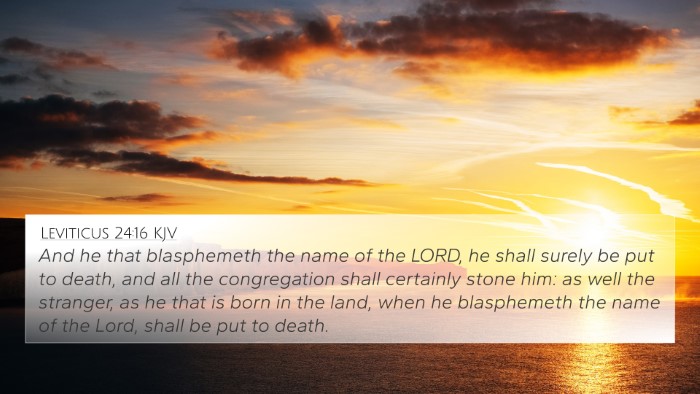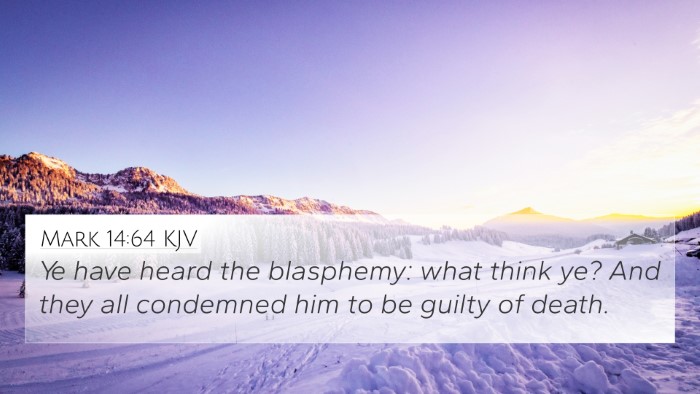Understanding Matthew 9:3
Verse: Matthew 9:3 - "And, behold, certain of the scribes said within themselves, This man blasphemeth."
This verse captures a critical moment during one of Jesus' early miracles when He forgives a paralytic's sins, prompting a strong reaction from the religious leaders.
Summary of Meaning
Matthew 9:3 illustrates the response of the scribes who doubted Jesus' authority and accused Him of blasphemy. This moment serves to highlight the tension between Jesus and the religious authorities of His time.
Insights from Public Domain Commentaries
-
Matthew Henry:
Henry emphasizes the incredulity of the scribes. Their internal objection to Jesus' claims reflects a hardened heart towards His divine authority. The sin of blasphemy, in their eyes, was a serious offense, signaling their rejection of Jesus as the Messiah and His teachings.
-
Albert Barnes:
Barnes elaborates on the broader implications of the scribes’ accusation. He suggests that their skepticism reveals an underlying fear of losing their influence and position. By calling Jesus a blasphemer, they attempted to protect their traditional understanding of the law, which Jesus was challenging through His acts of compassion and divine authority.
-
Adam Clarke:
Clarke provides a theological perspective, explaining that the scribes' thoughts reflect their lack of understanding of Jesus’ nature and mission. Their charge of blasphemy reveals a willful blindness to the miracles and teachings of Christ, culminating in a critical rejection of His divine mandate.
Thematic Connections and Cross-References
Matthew 9:3 can be linked to various other Bible verses that deal with themes of authority, faith, and the recognition of God’s work among humanity. Here are some notable cross-references:
- Mark 2:7: "Why doth this man thus speak blasphemies? who can forgive sins but God only?" - This verse echoes similar sentiments, emphasizing the belief that only God has the authority to forgive sins.
- Luke 5:21: "And the scribes and Pharisees began to reason, saying, Who is this which speaketh blasphemies? who can forgive sins, but God alone?" - Presents another account of the scribes questioning Jesus' authority.
- Isaiah 53:5: "But He was wounded for our transgressions, He was bruised for our iniquities." - Prefigures the suffering servant, showing the necessity of forgiveness and atonement.
- John 10:33: "The Jews answered him, saying, For a good work we stone thee not; but for blasphemy; and because that thou, being a man, makest thyself God." - Provides insight into the ongoing conflict between Jesus and the Jewish leaders.
- Acts 5:29: "Then Peter and the other apostles answered and said, We ought to obey God rather than men." - Highlights the theme of divine authority that challenges human authority.
- Romans 3:23: "For all have sinned, and come short of the glory of God." - Underlines the need for forgiveness that Jesus offered, countering the scribes' rigid legalism.
- Hebrews 4:14-16: "Seeing then that we have a great high priest, that is passed into the heavens, Jesus the Son of God, let us hold fast our profession." - Jesus' role as mediator and high priest is established here, contrasting with the scribes' interpretations.
- Matthew 12:31: "Wherefore I say unto you, All manner of sin and blasphemy shall be forgiven unto men, but the blasphemy against the Holy Ghost shall not be forgiven unto men." - This verse reflects the seriousness of the scribes' charge as it pertains to denying the manifestation of the Holy Spirit's work.
- Luke 6:5: "And He said unto them, That the Son of man is Lord also of the sabbath." - Reinforces Jesus’ authority to interpret and fulfill the law beyond traditional constraints.
Comparative Analysis of Related Verses
To fully grasp the implications of Matthew 9:3, one can engage in a comparative Bible verse analysis. By examining the objections of the scribes in various Gospel accounts, we can uncover the layers of misunderstanding surrounding Jesus’ divine authority and mission:
- Connections between Old and New Testament: The continuity of God’s redemptive plan from Isaiah's prophecies to Jesus’ fulfillment is significant.
- Cross-referencing Psalms with New Testament teachings: Understanding how the Psalms speak to the coming Messiah helps in interpreting the accusations raised against Jesus.
- Inter-Biblical dialogue: This verse encourages dialogue between various scriptural texts to grasp the full picture of Christ's ministry and the reactions of the religious leaders.
Using Cross-References in Study
To deepen your understanding of scripture, utilizing tools for Bible cross-referencing is beneficial. Consider the following:
- Bible concordance: Use a concordance to quickly find related passages that highlight the themes of authority and forgiveness.
- Cross-reference Bible study: Develop a study plan that focuses on key themes connected to Jesus' identity and the responses of the religious leaders.
- Comprehensive Bible cross-reference materials: Engage with resources that provide broader context for each verse.
Conclusion
In summary, Matthew 9:3 not only reflects the immediate reaction of the scribes but also invites believers to explore broader themes within the Bible through cross-referencing and thematic connections. Understanding this verse enriches one’s comprehension of Jesus' authority and the nature of faith.












